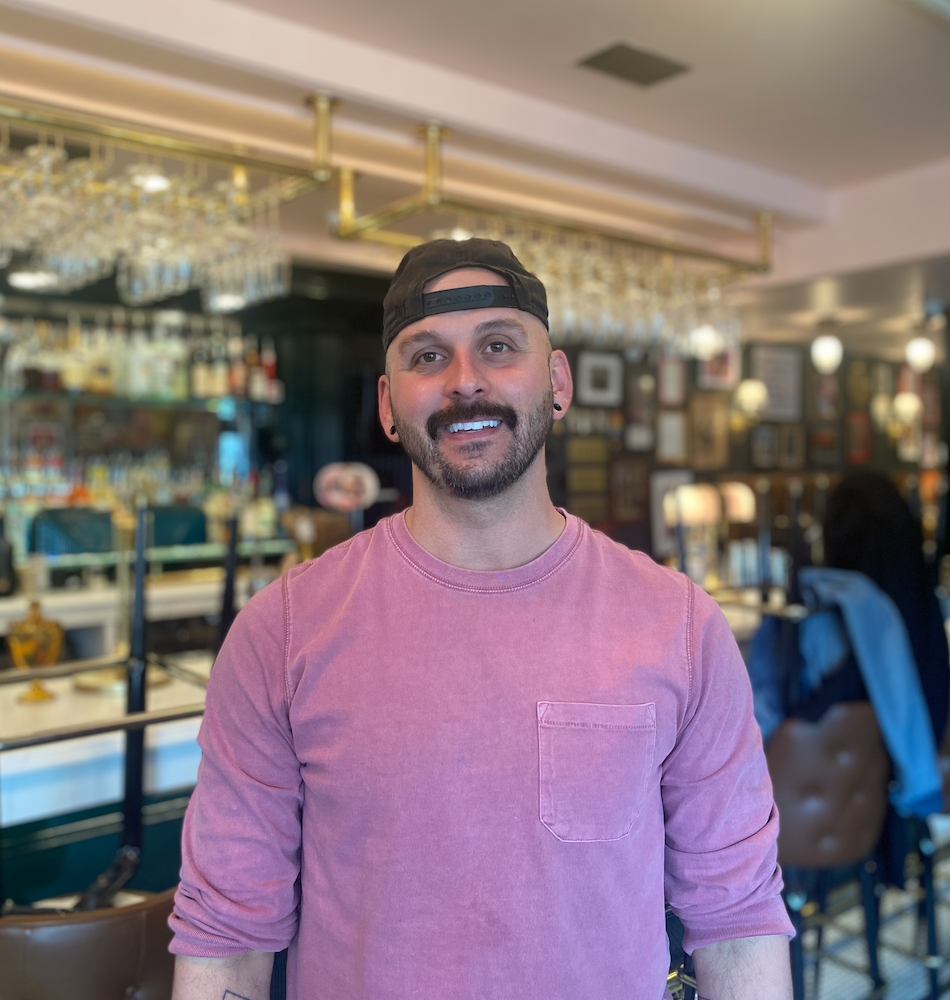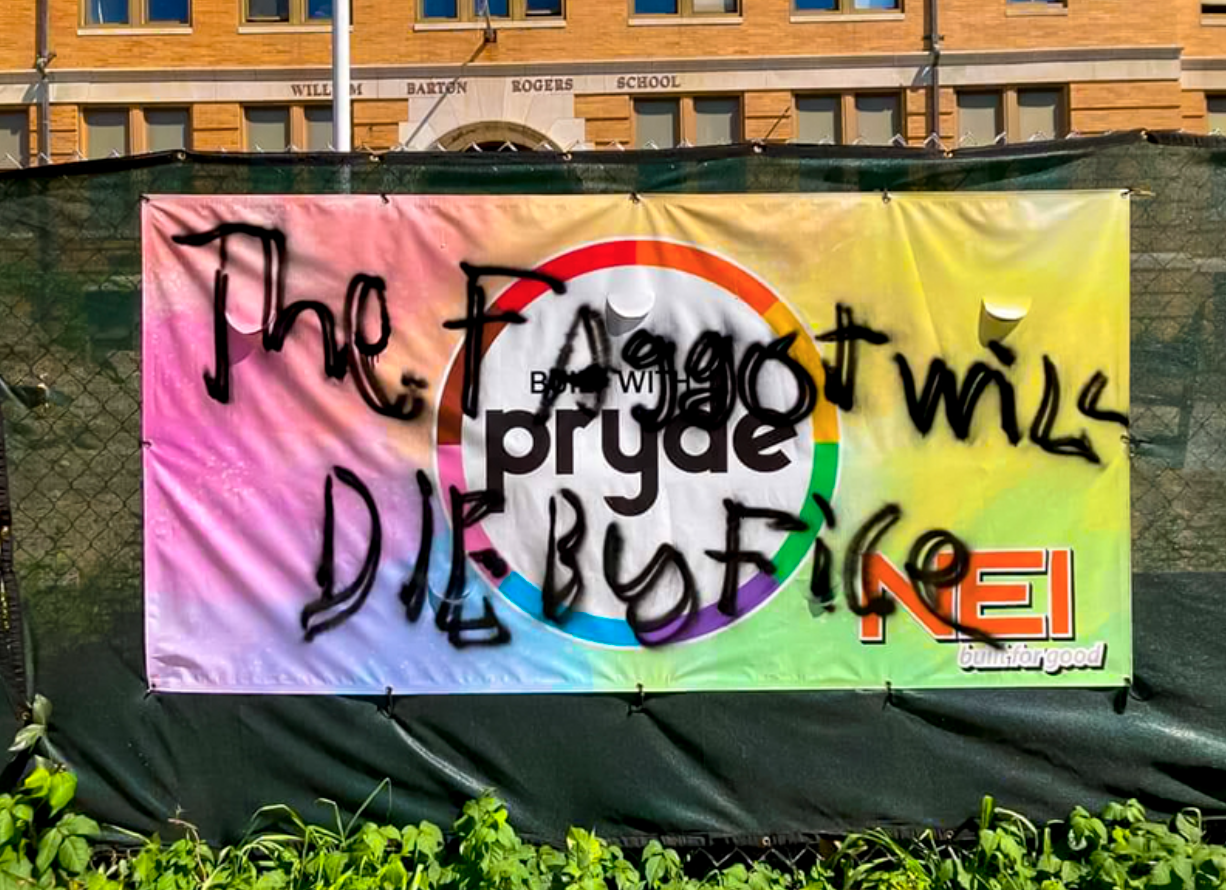WRITTEN WORKS
D.C.’s queer nightlife scene thriving, bucking national trends
John Etienne is familiar with the drifting sounds from vodka-fueled conversations and the tapping of feet against the floorboards of Trade, a gay bar in D.C.’s Logan Circle. On any other Thursday night, Etienne — a party host, judge, and queer nightlife socialite — would be up on the dance floor, sipping a gin and ginger ale, dancing to the new Beyonce song with friends.
But this is not just any Thursday.
Tonight he is sitting directly beneath the dance floor in a salon chair, adjusting his sparkly green dress and white go-go boots, flipping between checking his phone and looking at the clock, waiting for the other judges to arrive. It is just after 9 p.m. and Deep Cvnt is about to begin.
Deep Cvnt is a “mini ball deluxe-inspired party.” Etienne hosts the event once a month at Trade where queer people from across the city come to walk down a runway in categories, show off their best outfits to an established theme, and ‘vogue the house down’ making the “dive bar with a dance floor” feel like the set of a 2024 Paris is Burning. The party’s name is based on a slur, reclaimed into a symbol of feminine and queer empowerment.
John Etienne is familiar with the drifting sounds from vodka-fueled conversations and the tapping of feet against the floorboards of Trade, a gay bar in D.C.’s Logan Circle. On any other Thursday night, Etienne — a party host, judge, and queer nightlife socialite — would be up on the dance floor, sipping a gin and ginger ale, dancing to the new Beyonce song with friends.
But this is not just any Thursday.
Tonight he is sitting directly beneath the dance floor in a salon chair, adjusting his sparkly green dress and white go-go boots, flipping between checking his phone and looking at the clock, waiting for the other judges to arrive. It is just after 9 p.m. and Deep Cvnt is about to begin.
Deep Cvnt is a “mini ball deluxe-inspired party.” Etienne hosts the event once a month at Trade where queer people from across the city come to walk down a runway in categories, show off their best outfits to an established theme, and ‘vogue the house down’ making the “dive bar with a dance floor” feel like the set of a 2024 Paris is Burning. The party’s name is based on a slur, reclaimed into a symbol of feminine and queer empowerment.
During the day, the 25-year-old works as a Digital Fundraising Director for the House Majority PAC. To him, gay bars that host events are instrumental in fostering a feeling of welcome and belonging for those who identify as LGBTQ.
“[For me] It’s the sense of community,” Etienne said. “ I think that being able to go to a spot where there are people who are like me, in some shape or form being that they’re queer or from a marginalized community, and can find refuge in these spots is something that’s incredibly important. And then, too, I think that these [queer] spaces are just a lot more fun.”
Historically gay bars have acted as places for the LGBTQ community to gather, celebrate, and mobilize for political causes when the general attitude was more hostile to the community. D.C.’s unique queer nightlife scene sets it apart from other major gay hubs, like New York or San Francisco, due to the city’s number of welcoming spaces, its business appeal, and the strong presence of the federal government in its culture, allowing for the country’s capital city to be a statistical anomaly.
Nationwide, gay bars have been on the decline since the 1980s. Damron’s Travel Guide, a database that has been recording the locations and ratings of queer/gay bars since the 1960s, found that in the year 1980, there were approximately 1,432 gay bars across the United States. A recent study published in the National Library of Medicine found that the number of gay bars in the U.S. has nearly been cut in half, with only 803 queer-identified bars in existence despite increasing numbers of public support for the LGBTQ community.
Onlyfans, COVID, and Washington’s Gay Bathhouse:
How the Pandemic has changed the sex work industry
The glow of the dim red lights, steamy hot air, and soft grunting coming from the seemingly endless corridors – a regular night at the Crew Club. What’s not regular is the men carrying film cameras and phones, filming what is transpiring.
Most people don’t talk about their sexual escapades. Even fewer people film them to post on social media. Yet a group of people, mostly men, gather once a month at an event called Mass Collab – most recently on February 8th – to film these sexual escapades and post them to social media, viewable for a fee.
The Crew Club is one of Washington DC’s two gay bathhouses, public baths historically where gay men will sometimes meet each other for sex. Crew Club has hosted Mass Collab, where men gather to create art, since October 2021.
Some might call these people porn stars, exhibitionists, or adult content creators. Regardless of what they would call themselves, their work falls within the legal definition of sex work. The Amara Law Center, a legal center in Washington that focuses on sex work and sex work protections, defines sex work as any commercial sexual exchange. This definition has shifted in recent years to include changes in how people interact with each other now, including stripping, online webcams, and what the men attending Mass Collab do: in-person filming.
Streitmatter Award for Excellence 2023 Winning Article
“Happy Pride, everyone!”
The words, exclaimed so often, so jubilantly to a massive, cheering crowd from those on the main stage at Capital Pride, had special relevance last Sunday.
It was a moment that history was made.
The speaker was Vice President Kamala Harris, sporting a pink jacket and a smile that shone as brightly as the sun, casting a golden, magic-hour glow. With her words of greeting, Harris became the highest senior-level member of a current administration to speak at an LGBTQ pride event.
Photo: Ted Eytan/Capital Pride
Pride Cover Story
How sex work, the service industry, and the pandemic helped make The Little Gay Pub.
Dusty Martinez, co-owner and bartender explains how Onlyfans helps his business and the need to protect sex workers.
Dusty Martinez, the 36-year-old co-owner of Little Gay Pub has always felt connected with the service industry. His parents met while working at the same Denny’s, serving eggs and toast. His grandmother, whom Martinez says, was extremely dedicated to her craft as a bartender, sadly passed away working behind the bar. The service industry has always been an important part of his life.
“It has always been in my blood,” said the Glen Burnie native, his brown eyes lighting up as he recalled his loved ones.
With a plethora of experience stretching from his first job catering events at 15, to working at high-end hotel bars, and opening multiple prominent gay bars in Washington D.C. -including Trade, Number 9, and Town- it seemed like his “biggest dream” of owning a bar was the appropriate next step to take. Martinez, along with business partners Dito Sevilla and Benjamin Gander, opened The Little Gay Pub on March 24th. Since it’s opening two weeks ago, it is not uncommon to see lines of people waiting down P street to get inside. One reason for the lines is the bartender-owner himself- people cannot get enough of Dusty Martinez.
“I’m a social sweetheart,” said the man with 23 thousand Twitter followers with a little laugh. “I love that customer interaction.”
That interaction and ability to charm patrons lent itself to his second career- sex work.
“I’m very sex-positive. I like showing off. It’s fun,” he said, donning a backward hat and thick mustache.
Admiral Rachel Levine, the Assistant Secretary of Health at the U.S. Department of Health and Human Services, has called on Americans to stop politically-motivated attacks on transgender people, especially trans youth.
Speaking in a pre-recorded video aired during a Pride Month event hosted by the Israeli Embassy in Washington, D.C., Levine, who is Jewish, slammed proposed bills and recently passed laws seeking to restrict transgender rights, calling on Americans to “stand together against bullying.”
Appearing in full military uniform in the video, Levine explained how many transgender people in America are facing turbulent times, noting: “The past few months have been a difficult time for our LGBTQI+ community in the United States.”
Chris Sean Smith/ U.S. Public Health Service Commissioned Corps.
The Pryde, Boston’s first-ever LGBTQ senior home, currently under construction, was vandalized with threatening hate speech on Sunday, July 10.
LGBTQ Senior Housing Inc., a nonprofit that organized construction of the senior housing project, posted images of the graffiti on its Facebook page, which included the phrases “The faggots will die by fire” and “die slow.”
On its Facebook page, LGBTQ Senior Housing Inc. condemned the vandalism.
“We were heartbroken to wake up this morning to the terrible news that The Pryde was vandalized overnight with hate speech and threats spray painted on virtually every sign,” the statement read. “We will not let bullies and cowards stop our work to create safe and welcome affordable housing for our LGBTQ elders. We will not let hate go unchallenged in Hyde Park.”
Jo McDaniel, 40, has been preparing for this for years.
On the corner of Eighth and E streets on Capitol Hill, McDaniel stood next to a giant ladder with boxes around the dance floor, the humming of the ice machine in the kitchen, and the freshly painted walls and the scribbles of affirmation on the windows.
“I can’t talk about a broken system if I can in any way do better,” McDaniel said.
McDaniel, and her partner, Rach Pike, 36, decided to open an LGBTQ space in the district in early 2020, just as gay and lesbian bars have been disappearing nationwide.






